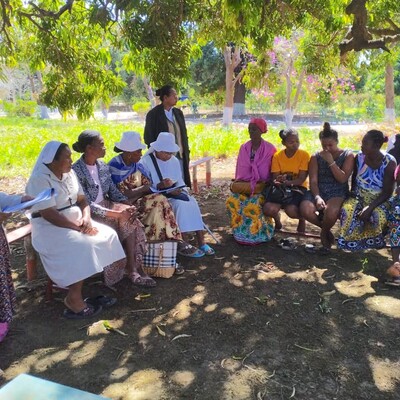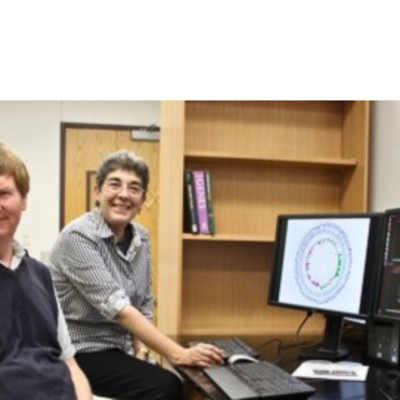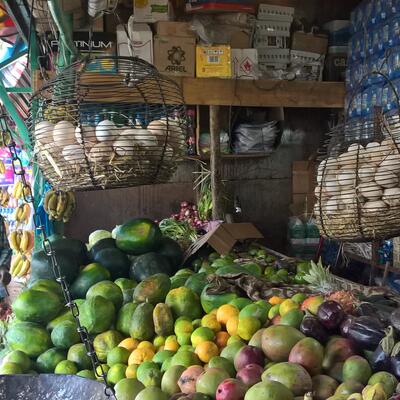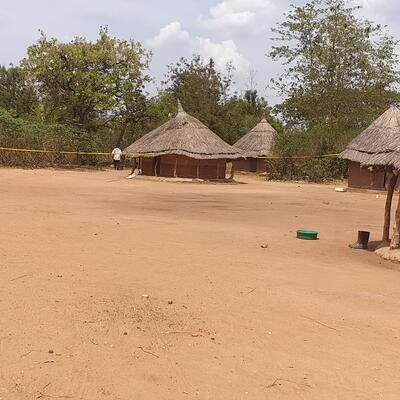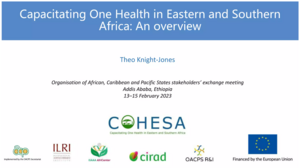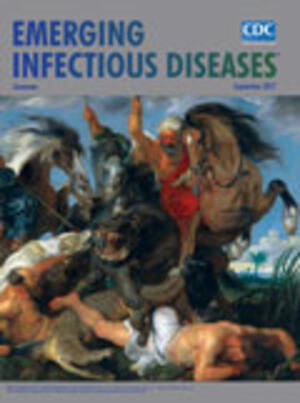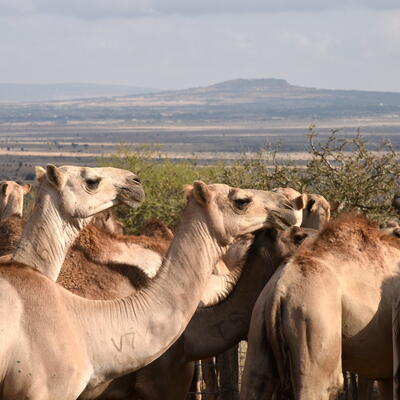
CGIAR scientists and research collaborators from Kenya discuss new One Health initiative
The world’s largest publicly-funded agricultural research partnership, CGIAR, is currently developing a series of initiatives to implement its 2030 research and innovation strategy that was launched in early 2021.
The research initiatives are designed to create lasting impact in five key areas:
- nutrition, health and food security;
- poverty reduction, livelihoods and jobs;
- gender equality, youth and social inclusion;
- climate adaptation and mitigation; and
- environmental health and biodiversity.
One of these research initiatives, Protecting human health through a One Health approach, aims to improve the prevention and control of antimicrobial resistance, foodborne diseases and zoonoses in seven target countries: Bangladesh, Côte d’Ivoire, Ethiopia, India, Kenya, Uganda and Vietnam.
The development of the One Health initiative is being led by a team of scientists from four CGIAR research centres — the International Food Policy Research Institute (IFPRI), the International Livestock Research Institute (ILRI), the International Water Management Institute (IWMI) and WorldFish — in collaboration with external research partners from Centre Suisse de Recherches Scientifiques en Côte d’Ivoire, EcoHealth Alliance and the University of Liverpool.
To ensure alignment of the proposed initiative with national priorities, the team convened a series of online consultative meetings with research collaborators to gain insights on the main One Health priorities, challenges, interventions and partner organizations in the respective countries.
The Kenya meeting, hosted by ILRI, took place on Wednesday 28 July 2021, bringing together some 30 participants from government ministries, universities as well as national and international research organizations.
Dieter Schillinger, ILRI’s deputy director general for biosciences research and development, opened the meeting with a word of welcome and an overview of CGIAR’s 2030 research and innovation strategy that will guide the implementation of the 33 new research initiatives, including that on One Health—the focus of the online consultation.
He mentioned that the development of the One Health research initiative is a collaborative process and ILRI is working closely with other CGIAR research centres as well as external partners from research and academia, including those represented at the meeting. He therefore welcomed feedback and suggestions from the participants to ensure the research of the One Health initiative is relevant and impactful.
Hung Nguyen, co-leader of ILRI’s Animal and Human Health program, followed with an overview of the rationale of the One Health initiative, citing the need for a One Health approach to tackle the complexity of the global public health challenges posed by the rising incidence of antimicrobial resistance, foodborne diseases and zoonoses.
He then outlined the three main objectives of the One Health initiative, namely, to generate evidence for decision-making; evaluate impacts of One Health approaches; and scale up innovations into national policies and programs.
He further highlighted the initiative’s Theory of Change, explaining how the research outputs are expected to lead to specific development outcomes and impact by 2030, in line with the United Nations Sustainable Development Goals. The team estimates that between 4 million and 41 million cases of disease will be averted annually through the initiative’s efforts.
The initiative’s research activities will take place through five work packages:
- zoonoses;
- food safety;
- antimicrobial resistance;
- environment (water and wildlife interfaces); and
- economics, governance and behaviour.
The work package leaders presented briefly on the goals of their respective work packages, giving examples of planned innovations under each.
Hung Nguyen explained that the food safety work package aims to reduce the burden of foodborne disease in traditional (informal) food value chains, with a focus on animal-source foods and other perishables such as fruits and vegetables. Planned innovations include training and certification of food handlers and traders, promotion of consumer demand for safe food, and behavioural nudges to encourage safe food handling practices.
Bernard Bett, ILRI senior scientist and head of the ILRI-hosted One Health Centre in Africa, outlined the two main objectives of the zoonoses work package: pre-empting the spread of zoonoses at the wildlife–livestock interface and reducing the incidence of zoonotic pathogens associated with poverty. Among other innovations, the work package plans to map the risk of key endemic zoonoses and develop diagnostic kits for surveillance of zoonoses.
Arshnee Moodley, who heads the ILRI-hosted CGIAR Antimicrobial Resistance Hub, said that the antimicrobial resistance work package will focus on reducing the burden of antimicrobial resistance by promoting the prudent use of antimicrobials in crop, fish and livestock production systems. In this regard, surveillance of antimicrobial use and antimicrobial resistance in animals and animal-source foods is important. Additionally, there is a need to generate and communicate evidence on the costs and benefits of rational use of antimicrobials to support uptake of interventions by farmers and policymakers.
In his overview of the environment work package, Javier Mateo-Sagasta, senior researcher at IWMI, noted that water is a key connector between people, livestock and ecosystems and so the focus will be on improving land use and water management to reduce health risks such as antimicrobial residues and zoonotic pathogens. Approaches will include recovery and reuse of animal waste to prevent water pollution and promotion of good practices to ensure the safe use of marginal quality water.
Vivian Hoffmann, senior research fellow at IFPRI, explained that the goal of the economics, governance and behaviour work package is to understand the drivers of people’s behaviour within food systems and the impact of policies and governance approaches on this behaviour. An example of an innovation under this work package is a performance management system for government officials responsible for implementing surveillance and enforcing regulations on antimicrobial use or food safety. Another innovation is a system to ensure inclusion of small-scale farmers, traders, food vendors and vulnerable groups so that they benefit from One Health outcomes.
During parallel group discussions on the zoonoses, food safety and antimicrobial resistance work packages, the participants gave feedback on the main One Health challenges, priority interventions, actions to ensure inclusion and partner institutions in Kenya.
With regard to control of zoonoses, among the key challenges identified were cross-sectoral coordination among government bodies and lack of adequate funding. Capacity development was noted as an area that needs to be strengthened at all levels. There is also a need to better understand the risks of zoonoses spillover from wildlife to livestock in boundary areas.
The main food safety challenges identified included aflatoxins, chemical contamination and inadequate capacity for effective food inspection. Capacity development was identified as a priority food safety intervention, in addition to strengthening of food safety legal frameworks at national and county levels, increasing consumer awareness and improving water quality and infrastructure.
The discussion on antimicrobial resistance identified the need for evidence on the costs and benefits of reducing antimicrobial use in order to get buy-in from policymakers. Regulation of veterinary drugs is another challenge, as is the enforcement of proper use of antimicrobials. There is a need for consumer education and strengthening of extension and veterinary services.
The use of participatory approaches and tailoring of communication to suit specific target audiences were suggested as some of the ways of ensuring inclusion of small-scale farmers, traders, vendors, women and youth at all levels of the value chain.
The identified partner groups to work with included government ministries of agriculture, health and environment (at national and county levels); national and international research organizations; universities; bureau of standards; farmer/producer groups; women’s groups; consumer organizations and civil-society organizations.
As the meeting ended, Sam Kariuki, acting director general of the Kenya Medical Research Institute, summed up the discussions as having been very engaging and fruitful. He urged the team to focus on practical approaches and leverage on low-cost, effective technologies to ensure that the planned interventions achieve positive impact among farmers on the ground.
‘Think big, but act local,’ he advised.
In his closing remarks, Dieter Schillinger thanked the participants for their contributions and said that the team would build on the ideas discussed and use them to fine-tune the development of the research initiative. He further assured the participants of CGIAR’s continued collaboration with and support of One Health partners in Kenya towards improved human, animal and environment health.
Once approved, the CGIAR One Health initiative will start in January 2022 and run for an initial three years.
For more information, please contact Hung Nguyen (h.nguyen@cgiar.org) or Vivian Hoffmann (v.hoffmann@cgiar.org).
Access the meeting notes and presentation slides
Citation
ILRI, IFPRI, IWMI and WorldFish. 2021. Kenya stakeholder consultation on a proposed CGIAR One Health initiative. Nairobi, Kenya: ILRI. https://hdl.handle.net/10568/114650
Photo credit: A typical mixed crop-livestock farming household, western Kenya (ILRI/Charlie Pye-Smith)







